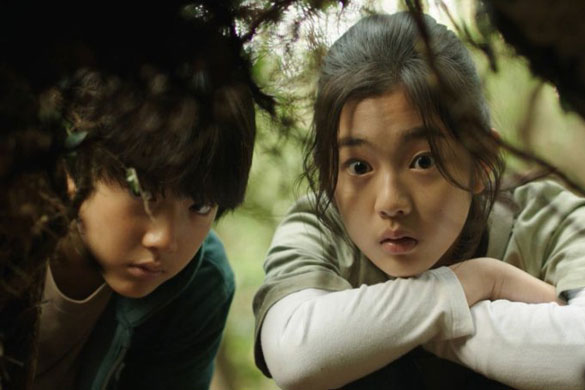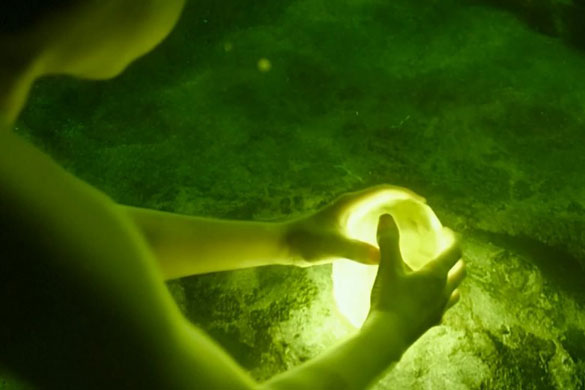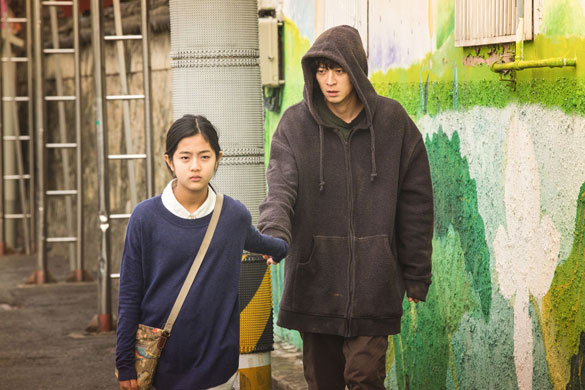
 |
||||
Following the death of her mother, teenager Soo-rin (Shin Eun-soo) moves to a rural Korean island with her stepfather as a result of his job in construction in the area. At her new school, Soo-rin is largely treated as somewhat of a freak by her classmates because of her interest in ghosts, her belief in out of body experiences and her thoughts on alternate dimensions. However, those very beliefs spark the interest of Sung-min (Lee Hyo-je) – a young boy living at a nearby orphanage – and slowly the two begin to bond. When Sung-min and his friends decide to check out a series of construction explosions being undertaken in the vicinity, Soo-rin tags along and on heading into the mountains they find a mysterious cave containing a strangely luminous green egg in a deep pool of water. Retrieving the egg, the boys take it outside while Soo-rin returns to the cave to find her lost hairpin but on eventually returning to the mountainside she finds that her friends (including Sung-min) have vanished, the only thing remaining being the broken shell of the egg. Soon after, as police begin an investigation into the boys’ disappearance, Soo-rin – to her utter shock and disbelief – is approached by an adult male (Gang Dong-won) claiming to be Sung-min and ready to explain both where he has been and why he is now thirty years old...
Review: ‘Vanishing Time’ begins with a visual of a covered camera lens full-frame, while text from the preface of a book on Soo-rin’s story by child psychiatrist Min Kyung-hee (Moon So-ri) is interspersed with a montage of frenetic scenes that we later discover are from the police investigation. The cover of the camera lens is then removed and as a filmed interview with Soo-rin begins (with very brief narration from our heroine) we step back in time to witness her arrival on the island.
And while we’re on the subject of the egg: Over the years from as far back as the New Korean Cinema wave of the late 90s and early 2000s, numerous Korean films in an absolute myriad of genres have used seemingly otherworldly objects as cause, justification and explanation for fantastical storylines. Whether you consider classic ‘Love Across Time’ romance genre films like Il Mare (2000) - two characters from different time periods connecting through an otherworldly mailbox; Ditto’s (2000) use of a ham radio to connect two students separated by 21 years; and Will You Be There's (2016) story enabled by time travel pills; or look at the absolute plethora of Korean horrors movies focused on, or strongly featuring, deadly or malevolently possessed objects – Phone (2002), in which a journalist who has broken a paedophile story begins receiving anonymous calls on her new phone that seem to change her daughter’s personality; Unborn but Forgotten (2002) which tells the story of people dying after visiting a website; the prominent featuring of a Ouija board at the start of Dead Friend’s (2004) tale of ghosts and possession; The Doll Master (2004) featuring a doll quite a bit more animated than most; the use of possessed footwear in 2005’s The Red Shoes; The Wig (2005) with its focus on a possessed wig, funnily enough; as well as more recent examples such as Don’t Click, about a video that seems to kill anyone who watches it; and even Killer Toon (2013) telling the story of an artist whose drawings become reality – these tales of fantastical objects facilitating fantastic stories have been so prevalent that they have almost formed a Korean cinema sub-genre in their own right.
In fact, the special effects appearing in the section of ‘Vanishing Time’ detailing what happened to Sung-min are some of the strongest and most memorable of the entire film. While fear of spoilers forces me to be somewhat vague, the interactions between characters moving at normal speed (from their perspective, at least) and objects (books, food, even water) moving in slow motion are absolutely stunning visually, while remaining subtle and never overused. ‘Vanishing Time’ deftly juxtaposes its fantasy story with the procedural drama of the police investigation into what authorities believe is an abduction and indeed murder. This balance feels wholly natural with two ideas standing out above all else:Firstly, the fact that the otherworldly aspects are believed only by the children and denied by the adults of the island, even if one adult is given evidence of the true state of play towards the film’s conclusion. In fact, at one stage Soo-rin deliberately lies because she knows if she tells the truth she won’t believed. Perhaps that is even a statement that in moving from childhood to adulthood, and putting away childish things, we lose something more than just innocence. We all too easily lose the belief and indeed the hope that anything is possible. This, to my mind, could even be considered a contrast between childhood and adulthood overall, further underlined by the differences in the focus of the film’s genre sections – the procedural drama being wholly adult attitude based, while in the fantastical segments the children and their more open perceptions take centre stage. Secondly, is the ongoing love between Soo-rin and Sung-min and the implication that their bond stays the same because both are still children at heart (or at least still want to be children, certainly from Sung-min’s perspective). At one point, Soo-rin asks (young) Sung-min if his love for her would last across dimensions, and ‘Vanishing Time’ ultimately shows that to be the case, and in a wholly thought-provoking manner. From an acting point of view, that love clearly being palpable even when Sung-min is played as an adult by Gang Dong-won says a lot for the quality of performances in and throughout ‘Vanishing Time’. Each viewer will take whatever they want, whatever they need, from the depictions of these ideas but one thing is virtually guaranteed. That is, 'Vanishing Time' giving pause for thought after the credits roll.
VANISHING TIME: A BOY WHO RETURNED (가려진시간)/ 2016 / Directed by Uhm Tae-hwa
|
||||
All images © Showbox, Barunson E&A Review © Paul Quinn |
||||



